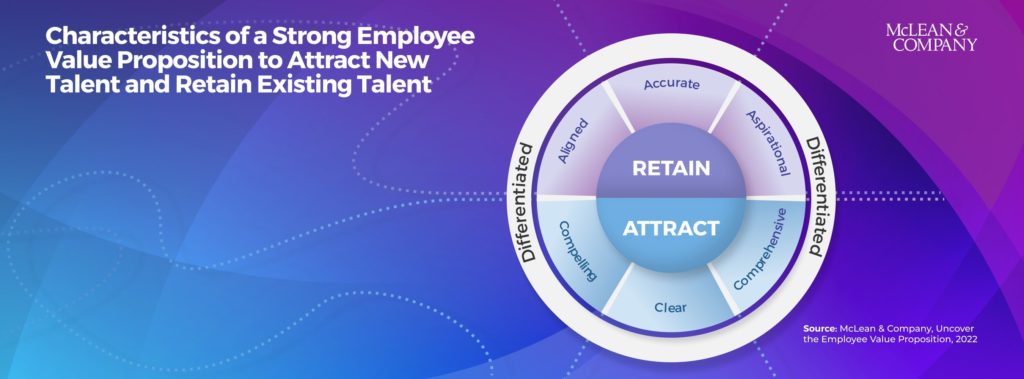Is your EVP outdated?
McLean & Company has published new EVP research called Uncover the Employee Value Proposition. The up-to-date blueprint offers HR leaders key considerations when addressing current labor market challenges to help them strategically highlight organizational strengths in a compelling and realistic way to both attract and retain the right talent.
“Talent attraction and retention challenges exist for all organizations, whether onsite, remote, or hybrid,” says Laura Ribadeneira, director, HR Research & Advisory Services at McLean & Company. “In an effort to combat these obstacles, a realistic and compelling employee value proposition (EVP) should be created.”
Laura Ribadeneira
McLean & Company’s blueprint explains that an up-to-date EVP provides a holistic view of the organization’s strengths and offerings. It also uncovers the lived experience and organizational offerings that employees highly value, allowing potential and current employees to both assess organizational fit and support acquisition and retention efforts.
With only 5% of organizations offering potential candidates an up-to-date EVP that accurately reflects the current employee experience, HR departments’ overall effectiveness at enabling recruiting decreased by 22% between 2021 and 2022, according to McLean & Company’s 2022 HR Trends Report. However, 43% of organizations have no plans to revisit their EVP despite the drastic changes to the work environment and the employee experience throughout the pandemic.
“A strong EVP supports recruiting efficiency, performance, retention, and productivity while diminishing turnover and recruitment costs,” continues Ribadeneira. “Organizations electing to forego updating and prioritizing their EVPs are doing their recruiting efforts a disservice.”
To support organizational and HR leaders in improving their talent attraction and retention strategies, the blueprint from the HR research and advisory firm features a four-step process to develop an up-to-date, organizationally aligned EVP below:
- Build a plan to develop the EVP – Identify the goals and success metrics for the EVP, select a project team and determine roles and responsibilities, and create a detailed project plan outlining key activities and timelines.
- Uncover the EVP – Collect and analyze data from focus groups and existing internal data sources, draft the EVP statements, and develop tailored EVP statements for key employee segments.
- Evaluate and refine the EVP – Evaluate the uniqueness of the EVP to ensure competitor differentiation, assess the alignment of the EVP with HR programs and policies, collect and integrate employee and candidate feedback into the EVP, and create a short elevator pitch.
- Implement and sustain the EVP – Create a communications plan to share the EVP internally, plan how to transition into the employer branding project that will promote the EVP, and establish guidelines around the sustainment of the EVP.
To learn more about developing and implementing an up-to-date EVP to improve talent attraction and retention for organizational and HR leaders, download the Uncover the Employee Value Proposition blueprint from McLean & Company.
